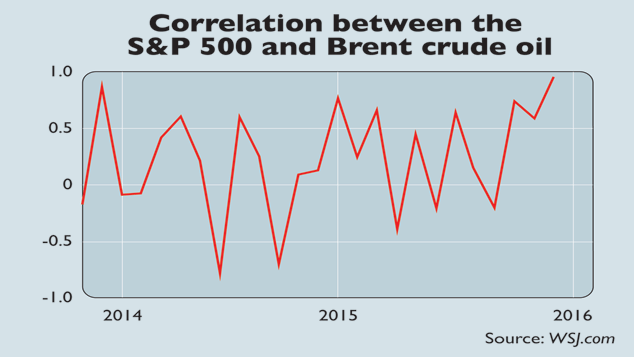The panic over oil is overdone
Traders are sticking to a misguided belief that low oil prices signal an imminent global recession. Andrew Van Sickle reports.

Get the latest financial news, insights and expert analysis from our award-winning MoneyWeek team, to help you understand what really matters when it comes to your finances.
You are now subscribed
Your newsletter sign-up was successful
Want to add more newsletters?

Twice daily
MoneyWeek
Get the latest financial news, insights and expert analysis from our award-winning MoneyWeek team, to help you understand what really matters when it comes to your finances.

Four times a week
Look After My Bills
Sign up to our free money-saving newsletter, filled with the latest news and expert advice to help you find the best tips and deals for managing your bills. Start saving today!

What a "perverse pattern", says Gene Epstein in Barron's. Equities and oilare joined at the hip.The correlation between the S&P 500 and Brent crude reached 0.97 in January (a figure of one would reflect perfect lockstep), the highest monthly reading since 1990. This makes no sense: "the overwhelming majority of global companies benefit from cheaper crude" there are more oil consumers than producers. Yet traders are sticking to a "misguided belief" that low oil prices signal "imminent global recession".
They are low because of a supply glut,not because demand is down."On average, cheaper oil should be a good thing," agrees Valentijn van Nieuwenhuijzen of NN Investment Partners. "But in this type of market it isn't about the average, it's about the fear of the unknown." Investors have conflated weaker oil, China, emerging markets and softer US data into a generalised growth panic. As Olivier Blanchard, formerly of the International Monetary Fund, puts it, "investors worry that other investors know something bad, so they just sell", even if they have no new data themselves.
Early this week, pan-European and UK stocks hit multi-year lows. Banks were hit hard, especially in Europe, where they could do with topping up capital and, unlike their American counterparts, still have bad loans "festering" on their balance sheets, as Max Colchester noteson The Wall Street Journal's website.
MoneyWeek
Subscribe to MoneyWeek today and get your first six magazine issues absolutely FREE

Sign up to Money Morning
Don't miss the latest investment and personal finances news, market analysis, plus money-saving tips with our free twice-daily newsletter
Don't miss the latest investment and personal finances news, market analysis, plus money-saving tips with our free twice-daily newsletter
Yet while the American economy may have lost some momentum lately, consumption, which accounts for 70% of GDP, remains robust. Household confidence is high and the labour market strong, with wage growth acceleratinglast month to an annual 2.5%. The drag from a stronger US dollar also looks set to fade now that interest-rate hikes are less likely.
Meanwhile, China's economy is stabilising, which should calm shattered nerves in raw-materials and emerging markets. And emerging-market debt levels, which some fear could tear holes in bank balance sheets worldwide, are high but manageable, reckons Capital Economics: "only a handful of emerging markets now face significant risks, in contrast to previous region-wide crises". That said, it's worth bearing in mind that stocks frequently fall in the absence of any downturn as American economist Paul Samuelson said: "Wall Street has predicted nine out of the last five recessions."
Get the latest financial news, insights and expert analysis from our award-winning MoneyWeek team, to help you understand what really matters when it comes to your finances.

-
 How a ‘great view’ from your home can boost its value by 35%
How a ‘great view’ from your home can boost its value by 35%A house that comes with a picturesque backdrop could add tens of thousands of pounds to its asking price – but how does each region compare?
-
 What is a care fees annuity and how much does it cost?
What is a care fees annuity and how much does it cost?How we will be cared for in our later years – and how much we are willing to pay for it – are conversations best had as early as possible. One option to cover the cost is a care fees annuity. We look at the pros and cons.